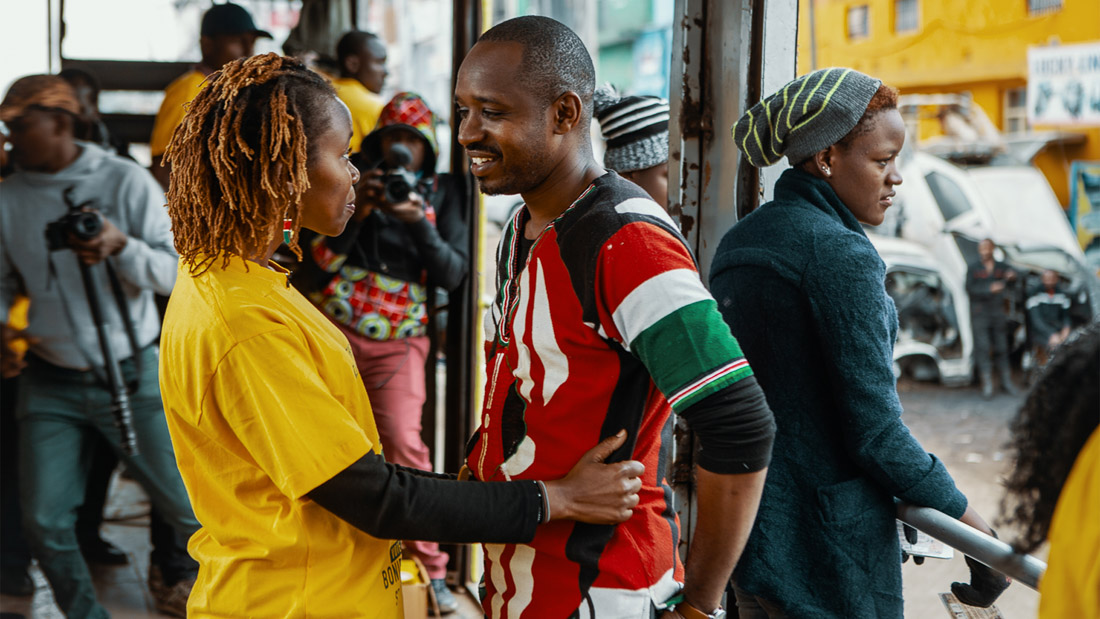 Back to selection
Back to selection
“I Believe That Stories Need to Try to Communicate Beyond Their Intended Audiences”: Sam Soko on His Sundance Doc Softie
 Softie
Softie Politics is a dirty business for sure. But too often we in America take for granted what younger democracies would view as unthinkable. That a strongman and his opponent might not broker a shared power arrangement behind closed doors. That police would not blithely shoot people who protest electoral outcomes in the streets. That one uncorrupt citizen determined to make change without paying constituents directly for their votes might be a viable candidate. These are the hopes and dreams embodied by Boniface “Softie” Mwangi, the grassroots activist turned politician star of Nairobi-based director Sam Soko’s intimate, Sundance (World Cinema Documentary Competition) debuting portrait Softie.
Prior to the doc’s January 25th premiere Filmmaker caught up with Soko to learn more about following this idealistic Kenyan’s run for office in a regional election – a rollercoaster ride filled with both inspiring optimism and very real death threats.
Filmmaker: How did you first meet Boniface “Softie” Mwangi — and why did he let you follow him with your camera? Did he see the film as publicity for his grassroots campaign?
Soko: I first met Boniface almost eight years ago. At the time I had decided to make short activist manuals. Together with some friends, who also aspired to make films, we found a space called PAWA 254. It is a creative and activist hub, so perfect for what I wanted to do.
Boniface is a co-founder of the space. The first time we met he invited me to go to a protest. I never went myself, but I used the footage to make a quick mockup of what I wanted to do — and that convinced him that I knew what I wanted to do. My plan wasn’t to take this long to finish, so I don’t think he considered the film as something that would help with his publicity. He’d released a book called Unbounded that I think worked really well for his campaign.
Filmmaker: With Softie, you smartly take a character-based approach to politics. (While here in the US, social activist filmmaking too often means dry talking heads.) Does Kenya’s strong storytelling tradition influence how you shape your work?
Soko: I draw so much inspiration both from Kenyan and African storytellers, as well as from many others in the world. Kenya is a very interesting cocktail of life. We are full of cultural influences — African, Arabic and Asian cultures have found their way into our lives. We naturally are not defined by one narrative influence.
We grow up learning from oral tradition, but also through our experiences in the streets. The works of authors like Ngũgĩ wa Thiong’o and Chinua Achebe influenced me, as well as the Kwani publications — Kwani is an urban publication that speaks to our present day lives and culture. In making Softie this is something I hoped to get across, a story that a Kenyan audience will appreciate as much as a global one.
Filmmaker: Considering the political violence in Kenya, what precautions do you take to protect yourself and your crew while filming?
Soko: The idea was to draw very little attention to ourselves. It wasn’t always successful, but that’s something we had to learn over time. We also had a lot of support from some of our funders — safety and security trainings, and emergency contacts in case something happened. We had to make conscious decisions about how we filmed and what we used to film. We feel blessed that we came through to share our experiences with the world.
Filmmaker: You’re the co-founder of LBx Africa, the Kenyan production company behind the 2018 Oscar–nominated narrative short Watu Wote. When it comes to developing projects, though, are there challenges that you consider specific to the country — or perhaps to Africa as a whole?
Soko: Our challenges as a country and as a continent have places where they connect and where they diverge. Some of the challenges that we share include scarce funding opportunities for projects, limited or no support from both the public and private sectors, and lack of access to training and mentorship opportunities. Some countries do have better structures and co-production treaties, while others don’t. There is also a difference in where quality content is developed more consistently. That means most of us have to be involved in building a foundation in what we know is a space that has incredible potential.
In Kenya, like in many other African countries, information is gold. Historically, those who came before rarely shared their experiences and lessons. If they did it was at a great price that many can’t afford. On Watu Wote we were a service producer, and we got to work with many creatives in our growing industry. We shared the lessons learned and the successes of the film. That is something we want to do with Softie as well. We are delighted with this experience, and we want to use it to encourage the development of more films.
Filmmaker: As a director and producer focused on sociopolitical storytelling, how is your work received by audiences in countries like the US and throughout Europe as opposed to in Kenya and across Africa?
Soko: I have yet to find out! So far so good. I believe that stories need to try to communicate beyond their intended audiences. I also want the Kenyan audience to enjoy the film as much as any other audiences around the world. In my case, collaborative editing helped find the harmony for a narrative that I think speaks to the universal themes of love and sacrifice. I can’t wait to share the film with the world, and I truly hope they enjoy it.
